
If you find Wikipedia as useful as I have over the years you may find this comment on a recent post thought-provoking. The post made about four days ago read:
"This weekend I've been watching Wikipedia with awe as soon as I became aware that a "tentative" article about me, https://lnkd.in/eE6kzFZ, was being created. Should that please me? Not necessarily, particularly when I look at who else is on there and who isn't but ... "surprise, surprise" ... the article is reasonable. In this day and age of fake and convoluted news that is a rare statement to make. For once someone's research is surprisingly good as everything written about me, albeit quite limited in focus, is broadly accurate and there are no fake photos of me hugging Idi Amin or Baby Doc Duvalier! Mind you, it's what's not there that really matters when it comes to Wikipedia and other profiles. Nevertheless, maybe they'll give me a job if they are that interested in what I was up to in the past."
However, once I saw that the biographical article on Wikipedia about me was being considered for possible deletion I decided to join in the debate: that helped ensure it was more likely to be deleted than not! I didn’t try to edit what was written. I just made some observations in public in as transparent manner as I could. At least one of Wikipedia’s senior administrators (or editors) did not support deleting the article too. The debate was in public (and can still be read if you have a few hours to spare and can follow link after convoluted link from the page where the article was posted).
Of course, Wikipedia are perfectly entitled to create nebulous rules and act as judge and jury about what is published on their website. I supported a view put forward that were the debate to have taken place in an English court of law the article would stand for obvious reasons: that was deemed by some to be worse than plagiarism. There were several grounds for deletion one of which was that the article lacked external references. An over-zealous administrator from Bangladesh had allegedly deleted many external references before criticizing the article for lack of such.
What I didn’t labour on was that there were much longer biographical articles about me on the web including one published in Everipedia who do check the veracity etc of their articles albeit not to the same degree as Wikipedia. All references to Everipedia were also deleted. You might well ask, why try to publish an article on Wikipedia too? That will have to remain a “known unknown”. Obviously one can speculate: for example, it could have been a smoke screen to try and entice someone to come in from the cold with information about the likes of Luckner Cambronne, the vampire of the Caribbean!
Putting speculation aside, anyone reading this post with time on their hands over Easter can have a say about the article anonymously or otherwise without even having to create an account on Wikipedia who have specifically asked:
1. Please share your thoughts on the matter at this article's entry on the Articles for deletion page. (You can say what you like within reason.)
2. Please improve this biographical article by adding secondary or tertiary sources. (Unlikely that you can help here but if you can that would be great.)
Wikipedia admit that they are now losing “market share” to Everipedia. Larry Sanger, one of Wikipedia’s co-founders, has jumped ship and works for Everipedia. Unlike Everipedia, Wikipedia is a “non-profit” organisation with thousands of volunteers who apparently toil away in far flung places “independently” editing/approving/deleting complex articles supposedly for free. Maybe that is why independent research suggests at least about 80% of what is published on Wikipedia is untrue. That research does not take account of fake data in articles which are “paid for”. It also fails to take account of important “omissions” such as failing to mention the side effects of prescribed medication which is rather important as many doctors use Wikipedia as a quick reference guide.
Wikipedia has some very well-meaning talented people and its original goals remain as commendable as they were ten years ago. However, its self-regulated "non-profit" modus operandi is now open to more abuse in so many ways particularly given the ascendancy of fake news. Everipedia, once firmly established on a blockchain, may well replace Wikipedia as the world's first port of call for encyclopedic information.
Bill Fairclough, Faire Sans Dire
This article was first published on 29 March 2018.